Top 10 Historical Manga [Updated]
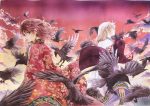
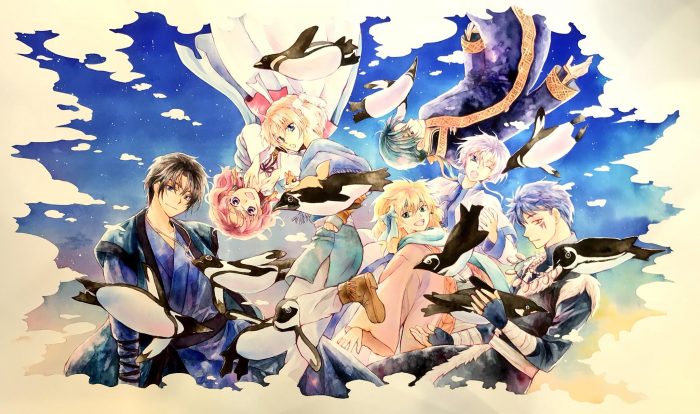
What is historical manga? Well, in a nutshell, historical manga is any manga that takes place during a certain time period in the past. Heavy emphasis on the “certain time period” part. Think about feudal Japan with their ninja and samurai, Victorian England with their extravagant dresses and horse-drawn carriages, or World War 2 with its massive tanks and menacing fighter planes. Those are the kinds of manga that we’ll talk about when we say historical manga. That being said, this is an updated list from the one that we already made years ago. The previous one presented quite a selection of historical manga that are set in Japan. So in order to make the new one fresh and different, we decided to venture outside of Japan and explore the world instead. So here are the top 10 historical manga that are set in 10 different countries.
10. Vinland Saga [Iceland]
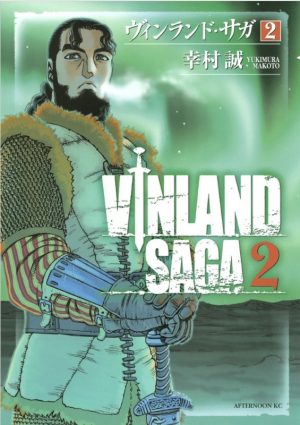
Let’s start this journey from the Scandinavia region first, and then slowly move our way towards Asia. And if we’re talking about Scandinavian countries, what better way to start than with the story of the Vikings, through the brutal yet fascinating manga called Vinland Saga. The story centers around a young Viking warrior named Thorfinn who embarks on a quest to avenge his father. He may have a short stature, especially when compared to his fellow Vikings, but when it comes to combat, he is one of the most ruthless warriors out there. Thorfinn’s vengeance takes him from his home in Iceland to different parts of the world, such as Denmark, Norway, and even England, just to name a few. Vinland Saga is famous for its incredible character development and thrilling action sequences, so prepare to be sucked into each and every scene if you decide to read this epic story.
9. 7-nin no Shakespeare (Seven Shakespeares) [England]

As the title suggests, this manga is a fictional biography of one of the most influential playwrights that ever lived, William Shakespeare. From his humble beginnings as a young man who simply wrote plays to earn money and impress the ladies at Stratford-upon-Avon, to penning masterpieces like Macbeth and Romeo and Juliet at the legendary Globe Theater, Seven Shakespeares covers almost the entirety of his adult life. Despite all of his accomplishments, however, there are still a lot of things that we don’t know about him. Some people even questioned how much of his work is actually made by him. This manga tries to answer that question in one of the most creative and interesting ways possible. Because just like it says in the title, there are seven Shakespeares in this manga. And if you haven’t realized it already, Seven Shakespeares is created by Harold Sakuishi, the author of the iconic music manga, Beck. So if you are still on the fence about whether to read this manga or not, well, don’t be. You should definitely read this manga.
8. Ookami no Kuchi: Wolfsmund (Wolfsmund) [Switzerland]
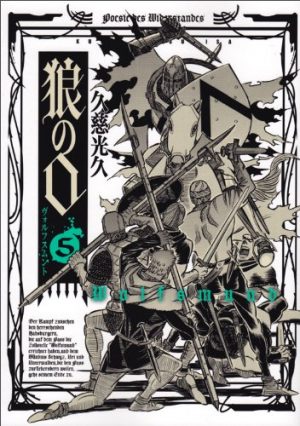
From the bustling Renaissance England, we now travel to the land of the Alpine mountain range, Switzerland. Wolfsmund is not a story about a person or a certain event - it is a story about a place. Deep in the St. Gotthard Pass, the main north-south artery that would allow you to cut through the Alps, stands a grim fortress called The Wolfsmund (Wolf's Maw). At this time, the Wolfsmund is under the command of a cunning and ruthless man named Wolfram. He is part of the Austrian Habsburg army and his main responsibility is to prevent any rebels and criminals from passing through the Wolfsmund. In order to achieve that objective, everybody who wants to pass shall undergo an incredibly thorough search and interviews. And for those who he deems to be suspicious, Wolfram tortures them and displays their mangled bodies at the entrance of the Wolfsmund as a warning to everybody else. At its core, Wolfsmund is a story about human cruelty, revenge, and different people coming together in order to achieve a greater goal. So you can expect to find lies, deceit, clever military tactics, and bloody battles all over this manga. It may not be as popular, but it is still as brutal and as epic as Vinland Saga.
7. Arte [Italy]
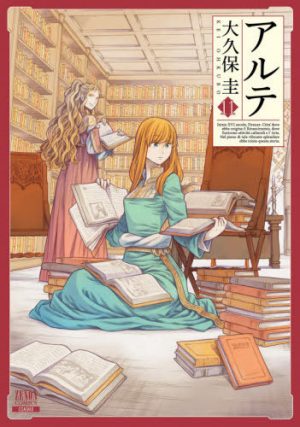
From the Alpine mountain range, we now move on to 16th century Italy, specifically the city of Firenze (Florence). At the time, paintings, sculptures, architecture, and all kinds of art were all the rage in Firenze. Everybody wanted to be an artist, wanted to learn from a master, and wanted to make art for nobles and get paid handsomely. Unfortunately, the world was quite insane back then, because the only ones who were allowed to be artists were men. But that doesn’t stop a girl named Arte from swimming against the current in order to fulfill her dream, which is to be a painter. Needless to say, there are tons of people that underestimate her, there are those who purposely stand in her way, and even the customers don't believe in her ability as a painter. But through her outstanding skills, hard work, and determination, she is pretty much on her way to greatness. As you can probably surmise by reading that short description, this is the manga that you should read if you want to feel inspired, entertained, and excited at the same time.
6. Shoukoku no Altair (Altair: A Record of Battles) [Turkey]
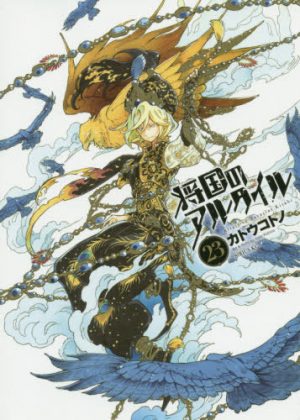
From talking about art in 16th century Italy, we now move on to discuss war and politics in 17th century Turkey. At the time of the story, Turkiye is at the height of its prosperity. Merchants come from all over the world to do business there, making their capital city of Altun one of the biggest hubs for traders, and a hotspot for travelers. Not only that, but the positions of government and military officials are mostly filled through a meritocratic system, which means that a promotion is earned based on one’s accomplishments and character. So at a glance, this is definitely one of the best times and places to be alive. But just like most things in life, there’s more to the nation than meets the eye. We follow the story through the eyes of a new and quite young Pasha (General) in Turkiye, The Golden Eagle Mahmut Pasha. We see as he struggles to find his place among the more experienced Pasha, and how he navigates through the political intrigue within the nation and the malicious intent emitted by the neighboring nations. We follow Mahmut as he desperately tries to prevent the upcoming war that will bring misfortune to every citizen. If such a complex and intricate story, along with beautifully choreographed combat and chaotic war scenes, are your cup of tea, then you should read Altair: A Record of Battles.
[ad_middle class="mt40 mb40"]
5. Otoyomegatari (A Bride’s Story) [Central Asia]
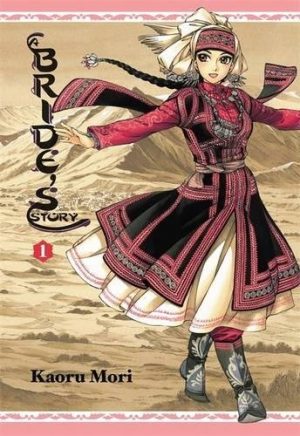
In 19th century Central Asia, specifically near the Caspian Sea, there are countless different tribes that live and trade with each other. Some of them have been living in the same place for centuries, while others are nomadic tribes that move from one place to the next. A Bride’s Story is a tale of a reunion between people who come from different backgrounds. A girl named Amir who comes from a well-known nomadic tribe marries a boy named Karluk who comes from a large tribe from a village near the Caspian Sea. There’s also Henry Smith, an English explorer who falls in love with a local woman, as well as the tale of Sherine, a widow who decided to enter a harem with her close friend, just to name a few. Through this charming cast of characters, we get to see different cultures and customs in that place blend together. Not only that, but the busy market where people from every facet of life trade with each other, the magnificent merchants who offer their wares along the Silk Road… all of that is rendered beautifully through Mori Kaoru’s intricate illustrations. Here, 19th century Central Asia truly comes alive with every turn of the page.
4. Kusuriya no Hitorigoto (The Apothecary Diaries) [China]
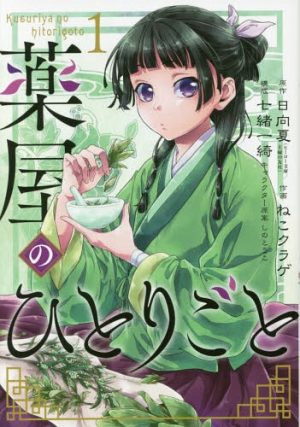
Life inside the royal palace is not all roses and rainbows, and that is especially the case if you have to live in the inner palace of the forbidden kingdom during ancient China. Because the inner palace is the place where the Emperor’s concubines live, and it’s not an exaggeration to say that it is one of the most hostile and dangerous places in the kingdom. The reason is simply because there are countless assassination attempts on the concubines and their children. So everybody has to be extremely cautious and anxious all the time. The most popular assasination method, by far, is poison. And that is where our main character comes in. Maomao is a teenage girl who is kidnapped and then sold to the palace in order to work as a lowly servant. However, unlike other servants, Maomao has a deep knowledge in herbal medicines. And it doesn’t take a long time for her to stumble upon a case within the inner palace, solve it, and save some lives. One thing leads to another, and she finds herself working as the poison tester for the Emperor’s favorite concubines. The Apothecary Diaries has a lot of different things going for it. It is an interesting slice of life story depicting the daily life within the mysterious inner palace, it is a thrilling mystery about different kinds of life-threatening cases, and there is also comedy and romance sprinkled throughout the story. What’s not to like?
3. Tenju no Kuni (Blissful Land) [Tibet]
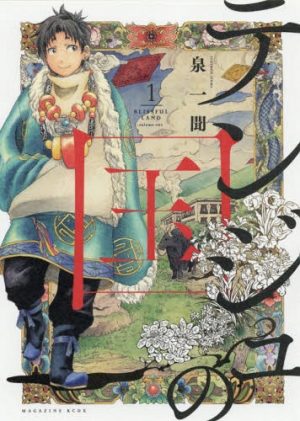
Blissful Land is similar to A Bride’s Story in a lot of ways. After all, both stories feature a young couple as they go through their daily life. The main difference, however, is the place. A Bride’s Story takes place in 19th century Central Asia, while Blissful Land is set in 18th century Tibet, specifically in a small mountain village. The story follows Khang Zippa, a teenage boy who works hard to be the village doctor, just like his father. One day after he finishes gathering some medicinal herbs, he comes back home and finds a large group of people in his house. Unbeknownst to him, his parents have apparently arranged a marriage partner for him, and the group is the family that has come to bring the bride to his house. So begins the daily life of a Tibetan young doctor and his cute wife. From dyeing clothes and threads using freshly-cut plants to making juicy and delicious steamed dumplings, Blissful Land offers us an intimate look into the daily life of the Tibetan people at the time. The people in this mountain village lead a relatively calm and uneventful life. This wholesome vibe is precisely the reason why Blissful Land is the perfect manga to read when you simply want to relax and feel warm inside.
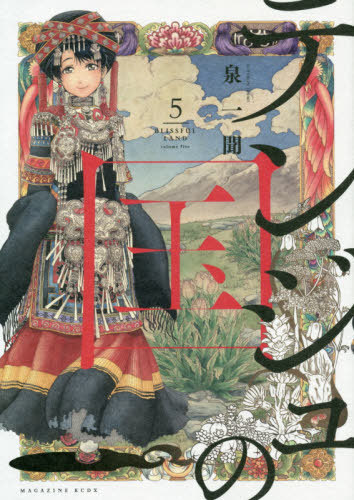
2. Akatsuki no Yona (Yona of the Dawn) [Korea]
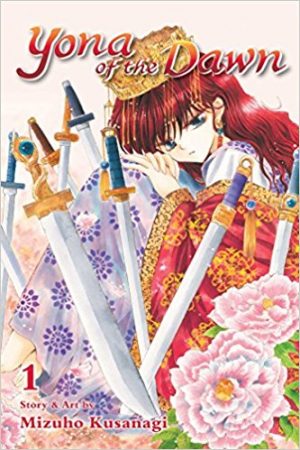
After Tibet, we now venture to the East, specifically to Korea. And that brings us to a manga that is based on a fictional version of feudal Korea, particularly during the Three Kingdoms period. So rather than the Goguryeo Kingdom, we get the Kingdom of Kohka instead. In the story, Yona is the sole princess of the Kohka Kingdom. She is spoiled by her father, the emperor, to the point that she doesn’t know any hardship nor anything that happens outside of her own bubble. But everything changes when her father is assassinated by the man she trusted the most, on her sixteen birthday. In order to stay alive, Yona is forced to leave the palace and live disguised as a commoner. At the same time, she has to see her father’s killer ascend to the throne as the new emperor of the Kohka Kingdom. Yona is devastated, but she knows that she has to get back on her feet soon. So begins a journey that leads her along a treacherous path as she bides her time and gathers the necessary support in order to claim what is rightfully hers. Yona of the Dawn is the only shoujo manga on this list, and yet when it comes to battle and political intrigue, it can stand toe to toe with any of the other entries. Not only that, but this manga actually has an edge over the others because of its heartfelt and complicated romance. So if that sounds like something you’d enjoy, be sure to read Yona of the Dawn.
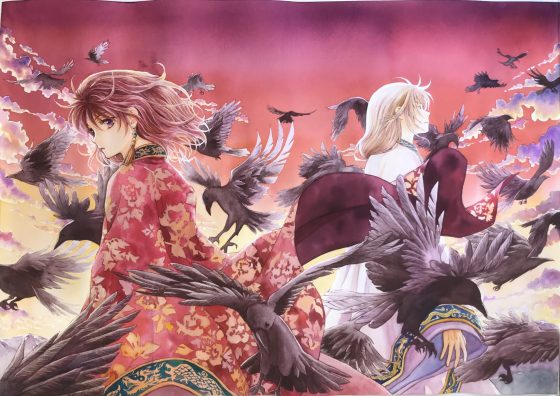
1. Golden Kamui (Golden Kamuy) [Japan]

From Iceland and all the way to Korea, we’ve journeyed across Europe and Asia with this list. And now, it’s time to finally go back to the birthplace of manga itself, Japan. There are tons of historical manga that take place in Japan, but for this list, let’s talk about the most recent one: both in terms of publication, and also in terms of time period. The story of Golden Kamuy takes place after the Russo-Japanese War, which is around 1905. It revolves around a war veteran, Sugimoto the Immortal, and the 24 escaped convicts. In the story, a man named Noppera-Bou robbed piles of the Ainu’s gold and hid it in a secret location. While he was incarcerated in the Abashiri prison, he tattooed the map of the treasure onto the skin of 24 convicts, and helped them escape from prison. After listening to the story about those tattooed convicts, the kind yet ruthless Sugimoto teams up with a resourceful Ainu girl named Asirpa to hunt those convicts, get their tattoos, and find the gold. This mission will lead them to meet all sorts of quirky and dangerous people. Furthermore, we will also get the chance to learn more about the Ainu people’s way of life, such as how they made their tools and how they cooked their foods. The immaculate combination of thrilling mystery, blood-churning action sequences, wholesome moments, and cultural study in Golden Kamuy are the reasons why you should definitely read it.
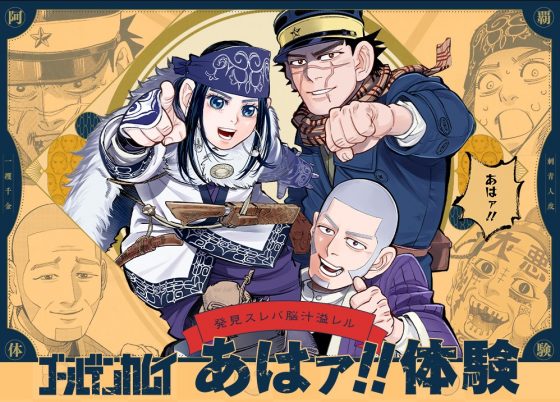
Final Thoughts
As promised, those are 10 historical manga that are set in 10 different countries. And although they all reside in the historical genre, each of them offers something unique and different. Some focus on action and mystery, while others focus on telling wholesome stories and heartwarming romance. By the way, we only feature manga that have received an official English translation here, so be sure to give these manga a try. Have you read any manga on this list? Or maybe you know other manga that deserve to be here? If so, don’t hesitate to share your list in the comment section below.
[hide]
Part of what makes manga such a ubiquitous part of Japanese culture is the sheer variety of genres, with something sure to pique even the most obscure of interests. One of the most enduring topics is history, both Japanese and around the globe. Readers are offered a window into an age gone by, as well as the opportunity to learn valuable info about mankind’s past while immersing themselves in an entertaining story. While historical manga might seem like an overly broad, somewhat rigid guideline for a story, writers have found surprising flexibility in the types of stories they create. Some adhere to events the way they folded out, but by adding fictitious elements to otherwise true stories, writers can create a sense of drama even more intriguing than the events they’re based off. Be it through a slice of life comedy, action-packed battlefields, or fantastical, original stories utilizing real-life characters, the historical genre is able to explore some of humanity’s most enduring themes. Here are our Top 10 Historical Manga!
10. Nobunaga no Chef
- Mangaka: Mitsuru Nishimura (story), Takuro Kajikawa (art)
- Genre: Historical, Comedy, Seinen
- Volumes: 16+
- Published Date: March 2011 – Present
Nobunaga no Chef tells the story of Ken, a modern-day chef who prides himself on his abilities to create extravagant menus from culinary traditions across the globe. He awakes to find himself mysteriously transported to a battlefield in Japan’s Warring States period, with no recollection of who he is or the circumstances that brought him there. Strangely enough, the only knowledge he has retained is culinary. Caught between soldiers on both sides, who assume he’s a spy due to his lack of military regalia, Ken is forced to run for his life. Along the way, he runs into Natsu, a young blacksmith girl disguised as a boy, who assists him in his flight. Able to cook dishes that people of the time have never dreamed of, it isn’t long before his reputation sees his talents sought out by Oda Nobunaga, the powerful warlord with dreams of unifying the country. Nobunaga no Chef fires on a lot of cylinders. It’s a fan-favorite because it centers around the exploits of one of Japan’s most beloved historical figures, Oda Nobunaga, and takes place in one of Japan’s most romanticized times. It blends comedic elements into the setting effortlessly, and also a heaping dose of immaculately illustrated dishes that will have the reader’s mouth watering as they turn the page. With an engaging story that teaches readers about history and food, it’s definitely worth a read.
9. Arslan Senki (The Heroic Legend of Arslan)
- Mangaka: Hiromu Arakawa
- Genre: Action/Adventure, Historical, Fantasy
- Volumes: 6+
- Published Date: July 2013 – Present
The Heroic Legend of Arslan has a storied history, first published as a series of fantasy novels written by Yoshiki Tanaka in 1986. The latest serialization is actually the second time that it has been adapted into a manga, this time in the hands of the legendary Hiromu Arakawa, of Full Metal Alchemist fame. Loosely based on the Persian epic of historical figure Amir Arsalan, the story is also heavily inspired by the life of Cyrus the Great, and other events of the 6th century BCE Persia, as well as the Byzantine – Persian Wars of 6th century CE. The story centers around the land of Pars, a wealthy kingdom that profits as a crossroads between its neighbors, and engages in institutionalized slavery. The leader of Pars, King Andragoras, holds a legendary reputation of being undefeated in battle and hopes to harden his soft-hearted son, Arslan, through rigorous military training. At war with the neighboring kingdom of Lusitania, Andragoras is betrayed in battle by one of his most trusted advisors, and Arslan is forced to flee for his life. With the help of his trusted retainer, Daryun, and a mismatched band of misfits, Arslan seeks to reclaim his place as crowned prince, and take back his country. The Heroic Legend of Arslan is a rich story based on a fairly obscure but essential part of history. It is brought to life by its expert illustrations, and the complex themes of morality explored in the early stages of the story. Battle sequences are white-knuckled, and as the series continues, fantastical elements are added, making an already intriguing story even more interesting. If readers have somehow missed out on this gem, now is the perfect time to start catching up.
8. Rainbow: Nisha Rokubou no Shichinin
- Mangaka: George Abe (story), Masasumi Kakizaki (art)
- Genre: Drama, Historical, Psychological
- Volumes: 22
- Published Date: November 2002 – January 2010
Rainbow is an award-winning manga that has been adapted into anime series. Set in Japan in the 1950s, Rainbow centers around six delinquent boys and their mentor, who are sent to the Shonan Special Reform School. While there, they learn to set their troubled pasts aside and rely on each other, while trying to cope with the atrocities and mistreatment they are subjected to daily. With an ensemble roster of main characters, Rainbow is a slow burn that gradually reveals the circumstances that lead to the incarceration of its seven protagonists. Although initially portrayed as rowdy, violent-prone kids who don’t fit into typical society, the series does a fantastic job of demonstrating exactly why one should never judge a book by its cover. Each character is fully realized, with complicated pasts deeply informed by Japan’s post-war period, and the rampant abuse of power that was all too common in institutions of the era. With such mature, complex themes, readers should prepare themselves for a heart-wrenching, thoughtful manga that never pulls punches, and is all the better for it.
7. Rurouni Kenshin (Rurouni Kenshin: Meiji Swordsman Romantic Story)
- Mangaka: Nobuhiro Watsuki
- Genre: Action, Historical, Drama
- Volumes: 28
- Published Date: April 1994 – September 1999
Perhaps one of Japan’s most well-known historical manga series’, Rurouni Kenshin has been adapted into an anime, as well as several live-action movies, thanks to its enduring popularity. Set at the end of the Edo period known as the bakumatsu, and the early stages of the Meiji Restoration, Rurouni Kenshin tells the story of Kenshin Himura, a former assassin known as Hitokiri Battosai during the blood-filled transition between the Edo period and the Meiji Restoration. After vowing to never take another human life, Kenshin wanders Japan protecting the innocent from those who mean them harm to help atone for his violent past. He arrives in Tokyo and begins to plant roots after assisting the operator of a dojo, Kaoru, in defeating an imposter. Rurouni Kenshin is remarkable for many reasons, especially its depiction of one of Japan’s most complicated periods. The series’ Tokyo is populated with complicated heroes and villains that are very much a product of the social and political growing pains of the time, and each volume is illustrated perfectly. The exploits of Kenshin and his friends effortlessly blends humor, action, and romance with mature themes of redemption and peace, making it an essential read for fans of multiple genres and history buffs alike.
6. Kingdom
- Mangaka: Yasuhisa Hara
- Genre: Action, Historical, Military
- Volumes: 44+
- Published Date: January 2006 – Present
Based on the immensely popular Warring States period in China often referred to as the Romance of the Three Kingdoms, Kingdom has also been adapted into a well-received anime series. Xin and Piao are orphans of the war in the kingdom of Qin, who dream of rising above their humble circumstances to become “Great Generals of the Heavens.” Piao is taken from their village by a minister for unknown reasons, only to return months later, on the verge of death, seeking Xin’s help. Piao was the double of Qin’s rule, Ying Zheng, who Xin agrees to assist in securing his throne. As a Qin commander, Xin fights to realize the dream once held by his departed friend and bring peace to the land. Kingdom has a staggering roster of characters, most of whom are actual historical figures who played important roles in China’s warring states period. The epic human drama unfolds over each action-packed page, with enough twists to surprise even the most devoted Chinese historian. As of writing, the publication is still going strong, with over forty volumes out already, there’s plenty for fans to sink their teeth into.
5. Vagabond
- Mangaka: Takehiko Inoue (Story, Art), Yoshikawa Eiji (Story)
- Genre: Action, Historical, Samurai
- Volumes: 37
- Published Date: March 1999 – May 2015
Another series set in Japan’s Warring States period, the Sengoku era, Vagabond follows Shinmen Takezou, a wild child with a violent streak who is shunned by the other members of his village. Along with his best friend Matahachi, Takezou runs away at seventeen to enlist in the Toyotomi army, hoping to find glory on the battlefield. What they find is death and destruction, as the Toyotomi suffer a crushing defeat at the Battle of Sekigahara, and they barely make it off the battlefield alive. The two become separated, and Takezou is strung up and left for dead until he is rescued by an itinerant monk, and christened with a new name: Musashi Miyamoto. Vagabond is a fictitious retelling of the life of one of Japan’s most legendary swordsmen, from his humble beginnings to his legendary rivalry with Sasaki Kojiro, and everything in between. Illustrated in a hyper-realistic style, the often-violent consequences of Takezou’s hot-headed actions are conveyed in such a way that the reader is transported. Takezou’s journey is brutal, but surprisingly human, with unexpected romantic and contemplative overtones that help round out the story. For fans of action and samurai drama, Vagabond is a must-read.
4. 20th Century Boys
- Mangaka: Naoki Urasawa
- Genre: History, Drama, Sci-Fi
- Volumes: 22
- Published Date: September 1999 – April 2006
20th Century Boys is a sci-fi series that spans generations. In 1969, four young boys build a secret fort in an empty field, where they spend their free time listening to the radio, reading comics, and getting into trouble. When their circle of friends expands, they create a journal they call “The Book of Prophecy,” where they imagine a future scenario where villains try to destroy the world, and it’s up to them to save it. Fast-forward to the late 90s, where one of the boys, Kenji, is now a grown man who owns and operates his own convenience store. Kenji stumbles upon a strange cult led by a mysterious man called “Friend,” while global disasters that resemble the writings in their journal begin to unfold. It’s up to Kenji and his friends to get to the bottom of things and discover how Friend is linked to their past. 20th Century Boys is an interesting blend of history and sci-fi, unlike any other series. Much of the narrative takes place in the past, and references popular culture at the time, especially songs and manga. The strange events that take place in the present and future of the story revolve heavily around a group of childhood friends trying to resolve issues from the past that have complicated their adult lives, with grounded, personal storytelling blending expertly with dystopian mystery. To say more would be to spoil half the fun of going along for the ride.
3. Kozure Ookami (Lone Wolf and Cub)
- Mangaka: Kazuo Koike (story), Goseki Kojima (art)
- Genre: Historical, Action, Samurai
- Volumes: 28
- Published Date: September 1970 – April 1976
The most enduring work to come from the collaboration of the legendary duo Kazuo Koike and Goseki Kojima, Lone Wolf and Cub tells an epic tale of revenge. Comprised of small vignettes, Lone Wolf and Cub centers around Ogami Ittou, former executioner of the Tokugawa Shogunate, who lost his family and his position in a treacherous plot carried out by the ambitious, black-hearted Yagyu clan. Together, with his son Daigoro, Ogami travels down the self-inflicted Hell of the assassin’s path, dead-set on revenge, no matter who stands in his way. Lone Wolf and Cub sees Ogami and Daigoro almost literally swimming in the blood of their enemies, each body bringing them one step closer to ultimate vengeance. And while the violence is flashy and brutal, each vignette tells a self-contained story that gives readers insight into the minutiae of life in the Edo period and the strict social codes by which people lived. A true classic, once fans have worked their way through the series, they can pick up the follow-up series New Lone Wolf and Cub, currently in publication.
2. Gekiga Hyouryuu (A Drifting Life)
- Mangaka: Yoshihiro Tatsumi
- Genre: Historical, Slice of Life, Autobiographical
- Volumes: 2
- Published Date: November 2008 – December 2008
Referred to as “the grandfather of Japanese alt-manga,” Yoshihiro Tatsumi is known for telling gritty, literary stories about the private, everyday lives of deeply flawed people. With A Drifting Life, Tatsumi turned his creative eye inward, telling his own personal story of growing up in post-war Japan and working tirelessly from a young age to help transform the newly-burgeoning manga industry into the global force it is today. A Drifting Life is essential reading for fans of manga, as it provides an insider’s firsthand account of the demands of tireless creative pursuit. Alongside contemporaries such as Tezuka Osamu, Tatsumi, and his friends almost literally built the manga scene from the ground up by pioneering new genres, and creating more dynamic ways of storytelling. Like the life of Tatsumi himself, A Drifting Life is a labor of love and a fitting swansong for one of the industry’s greatest forces.
1. Comic Showa-shi (Showa: A History of Japan)
- Mangaka: Shigeru Mizuki
- Genre: Historical, Autobiographical, Slice of Life
- Volumes: 8
- Published Date: November 1988 – December 1989
Best known for GeGeGe no Kitaro, and helping to bring Japanese folklore into the public consciousness, Shigeru Mizuki’s Showa is an autobiographical work that weaves together narratives that are both deeply personal and globally significant. As the name would imply, it offers a broad historical perspective of global events during an incredibly tumultuous time in the world, Japan’s Showa period, from 1923 onward. From his education in Japanese folklore from the eccentric old woman in his small town in Tottori prefecture, to his academic struggles in school, his enlistment in the Japanese army during WWII that included a tour to some of the most brutal locales in the Pacific theater, to his adjustment to life following Japan’s surrender, Showa offers invaluable insight into the Japanese experience, and how the country was shaped into what it is today. Meticulously researched, excellently written, and perfectly executed, Showa might be one of the most important manga ever written, and should be in the library of any true fan.
Final Thoughts
With that, our Top 10 Historical Manga goes down in history. With so many different genres blended together under such a broad category, it was incredibly difficult to narrow it down to only ten. Certainly, there are countless series’ that provided engaging perspectives on historical events across the globe. Are there any series’ that didn’t make the cut, that fans of historical manga would be foolish to miss out on? Sound off in the comments below and let us know!
[recommendedPost post_id='69139' url='' title='' img='' class='' widget_title=''] [recommendedPost post_id='68972' url='' title='' img='' class='' widget_title=''] [recommendedPost post_id='102647' url='' title='' img='' class='' widget_title=''] [recommendedPost post_id='158020' url='' title='' img='' class='' widget_title=''] [recommendedPost post_id='164913' url='' title='' img='' class='' widget_title=''] [recommendedPost post_id='199706' url='' title='' img='' class=''] [recommendedPost post_id='203313' url='' title='' img='' class='' widget_title=''] [recommendedPost post_id='291867' url='' title='' img='' class='' widget_title=''] [recommendedPost post_id='354368' url='' title='' img='' class='' widget_title=''] [recommendedPost post_id='353949' url='' title='' img='' class='' widget_title=''] [recommendedPost post_id='352507' url='' title='' img='' class='' widget_title='']

No comments